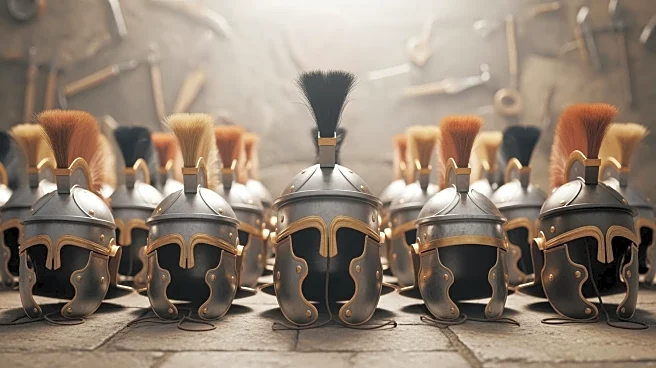What's Happening?
Archaeologists have discovered seven fully preserved skeletons in a mass grave in Croatia, identified as Roman soldiers from approximately 1,700 years ago. The remains were found in 2011 in a repurposed
water well in the ancient Roman city of Mursa, now modern-day Osijek. The soldiers, aged between 36-50 years old, were taller-than-average and robust, with diets primarily vegetarian but occasionally including meat and seafood. The skeletons exhibited various healed and unhealed injuries, including blunt force trauma and puncture wounds likely caused by arrows or spear tips. Researchers believe these men were victims of the Crisis of the Third Century, particularly the battle of Mursa in 260 CE, a period marked by civil wars and invasions.
Why It's Important?
This discovery provides significant insights into the historical conflicts during the Roman Empire, particularly the Crisis of the Third Century. The findings highlight the violent nature of the era and the impact of military conflicts on individuals. The identification of these soldiers contributes to the understanding of Roman military history and the socio-political dynamics of the time. It also underscores the importance of archaeological research in uncovering historical truths and preserving cultural heritage. The study of these remains can offer valuable information on the health, diet, and ancestry of Roman soldiers, enriching the historical narrative of the Roman Empire.
What's Next?
Further analysis of the remains could provide more detailed information about the soldiers' lives, including their origins and the specific circumstances of their deaths. Continued archaeological exploration in the area may uncover additional artifacts or remains that could shed light on the broader historical context of Mursa and its role in Roman history. Researchers may also explore the implications of mass graves in Roman times, considering the ethical and cultural dimensions of burial practices during periods of conflict.
Beyond the Headlines
The discovery raises questions about the ethical considerations of mass burials and the treatment of soldiers during wartime. It also prompts a reevaluation of historical narratives regarding the Roman Empire's military strategies and the human cost of its expansion. The findings may influence contemporary discussions on the preservation of historical sites and the importance of protecting archaeological discoveries.









